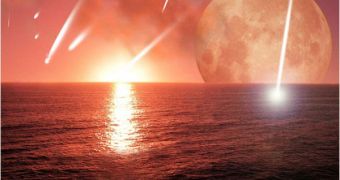By analyzing a wealth of data, a researcher at the Texas Tech University (TTU) developed an impressive theory on how life began on Earth. Without comet and meteorite impacts, the expert argues, the earliest lifeforms may have never occurred on our planet, leaving it just as desolate as its neighbors.
The work was conducted by the TTU Horn Professor of Geosciences, Sankar Chatterjee, who is also the curator of paleontology at the TTU Museum. He analyzed data describing the earliest geological history of our planet, and then cross-referenced them with various theories of chemical evolution.
The expert argues that this new view goes a long way towards explaining one of the hellish and mysterious periods in the history of our planet. Geologists know that numerous cosmic bombardments occurred shortly after Earth solidified, more than 4 billion years ago.
Chatterjee suggests that life originated in the craters formed by meteorites and comets as they rained down on Earth during epochs such as the Late Heavy Bombardment, which occurred 4.1 to 3.8 billion years ago. The LHB saw thousands upon thousands of comets slamming into our planet.
Some researchers have suggested that this bombardment is responsible for seeding Earth's oceans. A number of studies show that our planet has a lot more water than it should, and some experts suggest that the surplus may have been brought here on comets from the faraway Oort Cloud.
Chatterjee argues that the craters left behind by these impacts contained water melted from comets, as well as the chemical building blocks of the earliest organisms. It could be that areas of the planet unaffected by the impacts simply did not provide the necessary conditions for life to emerge.
“When the Earth formed some 4.5 billion years ago, it was a sterile planet inhospitable to living organisms. It was a seething cauldron of erupting volcanoes, raining meteors and hot, noxious gases,” the researcher explained, quoted by AstroBiology.
“One billion years later, it was a placid, watery planet teeming with microbial life – the ancestors to all living things,” he said at the 125th Anniversary Annual Meeting of the Geological Society of America, held in Denver, Colorado, on October 31.

 14 DAY TRIAL //
14 DAY TRIAL //